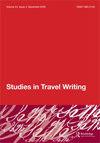Transculturation and Islamicate “English” daughters in Elizabeth Marsh’s The Female Captive: A Narrative of Facts, Which happened in Barbary in the Year 1756
Q2 Arts and Humanities
引用次数: 0
Abstract
ABSTRACT This article assesses the transcultural subject formation of seventeenth- and eighteenth-century British girls and women who navigated between abjection, accommodation, and assimilation while held captive in the Maghreb, the westernmost region of the classical Islamic world, for months, years, or even a lifetime. It does so by considering them in relation to the daughters of renegades – Christian European converts – who were born in the Maghreb and into the Muslim faith but who continued to be identified as English. Dwelling on the first narrative of an Englishwoman’s travels and captivity in Morocco, Elizabeth Marsh’s The Female Captive: A Narrative of Facts, Which happened in Barbary in the Year 1756, not published until 1769, it argues that the direction of transculturation for both categories of “English” daughters tended towards the Islamicate rather than the other way around even as their gendered negotiations rendered their relationship to their national identities malleable.伊丽莎白·马什1756年发生在巴巴里的《女性俘虏:事实的叙述》中的跨文化与“英国”女儿的伊斯兰化
摘要本文评估了17世纪和18世纪英国女孩和妇女的跨文化主体形成,她们在被囚禁在古典伊斯兰世界最西部的马格里布长达数月、数年甚至一生的过程中,在放逐、迁就和同化之间徘徊。它通过将他们与叛离者的女儿联系起来来做到这一点,叛离者是欧洲基督教皈依者,出生在马格里布,信奉穆斯林信仰,但仍被认定为英国人。伊丽莎白·马什(Elizabeth Marsh)的《女性俘虏:事实的叙述》(the Female Captive:A narrative of Facts)讲述了一位英国女性在摩洛哥的旅行和囚禁,1756年发生在巴巴里,直到1769年才出版,它认为,这两类“英国”女儿的跨文化方向都倾向于伊斯兰主义,而不是相反,尽管她们的性别谈判使她们与国家身份的关系具有可塑性。
本文章由计算机程序翻译,如有差异,请以英文原文为准。
求助全文
约1分钟内获得全文
求助全文
来源期刊

Studies in Travel Writing
Arts and Humanities-Literature and Literary Theory
CiteScore
0.40
自引率
0.00%
发文量
13
期刊介绍:
Founded in 1997 by Tim Youngs, Studies in Travel Writing is an international, refereed journal dedicated to research on travel texts and to scholarly approaches to them. Unrestricted by period or region of study, the journal allows for specific contexts of travel writing to be established and for the application of a range of scholarly and critical approaches. It welcomes contributions from within, between or across academic disciplines; from senior scholars and from those at the start of their careers. It also publishes original interviews with travel writers, special themed issues, and book reviews.
 求助内容:
求助内容: 应助结果提醒方式:
应助结果提醒方式:


